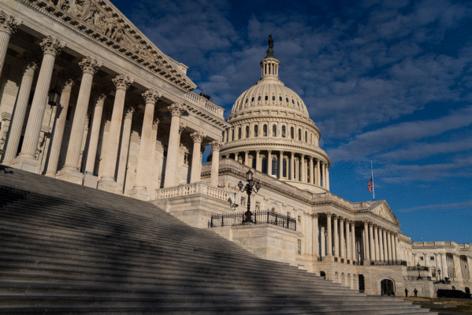A 32-hour week? It could work for Congress, staff say
Published in Political News
WASHINGTON — The Congressional Progressive Staff Association thinks Hill aides should be working smarter, not harder. So, in a letter to congressional leadership Thursday, the group is asking members to consider 32-hour workweeks in their offices.
“By establishing a rotating 32-hour workweek for District and D.C. staff, you can help increase retention, boost productivity, and improve the quality of life for your team,” the group wrote.
The CPSA has no expectations for a sweeping policy change on the Hill; they just want a few members to experiment with a shortened workweek in their offices or committees. “We’re urging members to give it a shot, to pilot it for a six-month period,” CPSA spokesman Michael Suchecki said. “If it doesn’t work 100 percent, bring it back to the way it was.”
“I don’t expect John Thune or Hakeem Jeffries coming out tomorrow and endorsing this proposal. … Frankly, I’d be happy if they did it in five years,” Suchecki added. “Fundamentally, what we’re hoping for is that we have openness to it.”
The CPSA, which calls itself the largest Hill staff organization at roughly 1,500 members, suggests a 32-hour workweek for Hill staff when Congress is out of session, and a 32-hour workweek for district staff when members are in Washington, without any reduction in pay or benefits.
The idea of working less while still accomplishing the same as before isn’t as far-fetched as it might sound. The CPSA points to the experience of companies in the United Kingdom that trialed shortened work weeks in 2022, finding that revenue remained stable while employee burnout and stress dropped. The vast majority decided to continue the reduced schedules after the study ended.
Some Hill offices already dabble with shorter hours during slow periods. Aides for Rep. Seth Moulton, D-Mass., enjoy “August Summer Fridays,” said spokesperson Sydney Simon. “We’re proud to have a culture in our office that offers some flexibility for our staff — and that’s rooted in trust and accountability,” she said.
Last Congress, Reps. Ro Khanna, D-Calif., and Barry Moore, R-Ala., won awards from the Congressional Management Foundation for workplace culture, thanks in part to flexible schedules.
The letter also cites a bill, introduced last session by Vermont independent Bernie Sanders in the Senate and California Democrat Mark Takano in the House, that would reduce the workweek under federal law from 40 hours to 32 hours, with overtime for workdays longer than eight hours.
By trying it themselves, Congress could demonstrate how unobtrusive a 32-hour workweek is to employers. “Members of Congress can help to advance the discussion around a more sustainable workweek as a national priority and model how it can work for private and public employers,” the letter reads.
Neither Sanders’ nor Takano’s office responded to a request for comment.
The CPSA’s push for more flexible work arrangements on Capitol Hill comes as Republicans, now in full control of Congress and about to take the White House, are preparing to restrict work-from-home policies for the rest of the federal government.
At a House Oversight and Government Reform Committee hearing Wednesday, Chairman James Comer, R-Ky., promised that “President Trump is going to change the way Washington works and will bring accountability to the unelected federal bureaucracy.”
“This includes ensuring the federal workforce is held accountable to the American people and ensuring they show up to the office for work,” he added.
The CPSA acknowledged the awkward timing. “I’ll be honest here: This initiative had more optimism behind it when the election was undecided,” Suchecki said. “This is something the [CPSA] board had been discussing for a long time, as something we heard calls for, both from members as well as from the left.”
Democrats have countered that Republicans’ focus on workforce policies have little to do with government efficiency or efficacy, but are instead just an excuse to take an ax indiscriminately to the federal workforce, pointing to Project 2025 and statements by Vivek Ramaswamy, a co-head of an informal taskforce called the Department of Government Efficiency, or DOGE. Ramaswamy told Fox News in November that requiring federal workers to return to the office full time would lead to “many voluntary reductions in force of the workforce in the federal government along the way,” which would be “a good side effect of those policies as well.”
Federal employee unions have also pushed back, noting that the Office of Management and Budget released a report in August finding that telework-eligible workers spent 61 percent of their time working in-person, and that federal employees in general, excluding fully remote workers who don’t have an office, were in person 79 percent of the time.
Writing in 1930, the famed economist John Maynard Keynes predicted that technological advances would reduce the average working week down to 15 hours by 2030. And while weekly working hours for U.S. full-time nonfarm workers may have dropped from over 60 to around 40 in Keynes’ lifetime, there it has remained. According to Bureau of Labor Statistics data, weekly hours for all private nonfarm workers — including part-time employees — averaged just above 34 in 2024. At the same time, the U.S. gross domestic product has grown from $260 billion in 1947 to $29 trillion today, and per capita GDP from $15,000 to $69,000. Rather than work less, we simply produce and consume more.
The length of the average workweek fell in large part thanks to the adoption of the Fair Labor Standards Act, which set the workweek at 40 hours starting in 1940.
©2025 CQ-Roll Call, Inc., All Rights Reserved. Visit cqrollcall.com. Distributed by Tribune Content Agency, LLC.




























































Comments